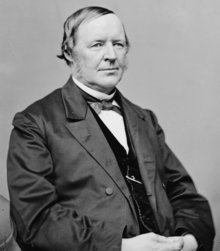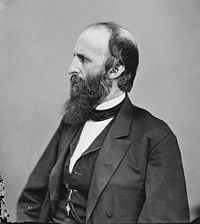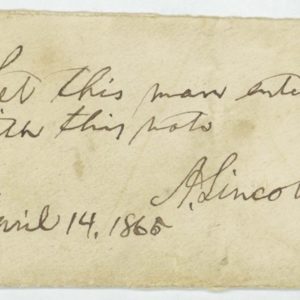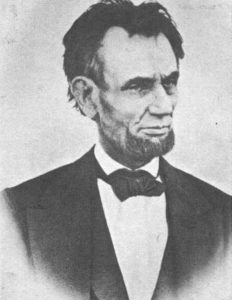An auctioneer’s story, by Martin Willis
Back in early 2001, on a bright sunny day I met an auction goer and former consignor at a bank in Durham, New Hampshire. She said she had something important in her safety deposit box that she wanted me to sell at auction. The bank was a beautiful brick Georgian style building perched above the Oyster River. We went into a private room with frosted glass windows, she opened the box, took out a folded document, and handed it to me. I carefully unfolded it saw it was an official New Hampshire 1865 petition and read the following simple phrase on the side of the document: “April 14, 1865, To Edwin M. Stanton, Hon. Secretary of War, please see and hear Hon. Mr. Rollins, & oblige him if you consistently can. A. LINCOLN”
When I first read this, I saw the date, and knew right away it was important as only a few pieces written on Lincoln’s last day were known to be in private hands. However, I was struck by how little content it had, it was just a one-liner written by our 16th President. I have held several documents, notes and letters in my hands from Abraham Lincoln that had some interesting dialog to them. This was quick and to the point to serve it’s purpose.

This was not my first encounter with a Lincoln’s last day document. About 15 years prior, I was in a historic home in Kennebunk, Maine. One of their ancestors was, Hugh McCulloch, who was the US Secretary of Treasury from March 9, 1865-March 7, 1869. The consignors let me sell McCulloch’s desk and chair that was used while he was in office and I was there to pick them up. While writing up the contract, I could not keep my eyes of all of the Lincoln letters on the wall in the dining room. The letters were framed and wasting away with acidic back boards. It is so important to house important documents in acid free materials and UV-filter glass, but that is another blog. I asked if I could take a moment and read the letters, and before long, I saw one dated April 14, 1865 and asked them if they knew the significance. I went on to ask if there was any way I could handle the letter at auction for them and told them it could be worth $20,000 or more. However, they were not ready to let it go at that time, but I stayed in touch as much as I could. A few years went by, and I had a consignment of a cane that was presented by Lincoln to his family doctor slated for an upcoming auction. I contacted the family again and they told me it was too late. F.O. Bailey a longtime and now closed auction house in Portland, Maine had sold the document a few months prior. I was surprised I had not heard about the sale, and found out that it sold for $40,000. At the time in the late 1980s, that was a pretty penny.

I was not about to let this one in-hand slip away from me this time. I contacted the consignor and asked what she knew of the document. She said that the family history was the following: her ancestor, New Hampshire Senator Edward Rollins had met with Lincoln prior to the assassination in a White House corridor and presented the petition, Lincoln noted and signed it on his knee. We sadly all know what happened a few hours later at Ford’s Theater. Rollins was there at Lincoln’s deathbed later that very evening and remained until his passing the following morning when Lincoln took his last breath at 7:22AM.
When Rollins eventually arrived home in New Hampshire, he decided to hang on the petition as a memento, instead of presenting it. This troubled me greatly, what if the family was not the rightful owners due to New Hampshire law? This after all was a legal New Hampshire document asking the government for money in 1865 and it was never handed over to the addressee, Secretary of War, Edward Stanton. I contacted a lawyer friend who looked into it, he knew of no precedence and told me not to loose any sleep over it. I mentioned that to the consignor, and told her that I was willing to move forward with it if she was.
After taking notes and researching at a university library I went through a set of books: “Collected Works of Abraham Lincoln“. I eventually went to Vol 8, page 413. My heart began to race as I discovered it was right there in print, with the supporting family hearsay annotated below. This was not an average last day note, it was written about 5:00 o’clock on that fateful day. Lincoln and his wife Mary departed a few hours later for Ford’s Theater. The simple phrase was not that simple, it was the second to last writing that the great President was ever known to write. As I look back, the one thing that has always puzzled me is; if Rollins kept this document to pass down through his family, it is a wonder how it made it into the above book.

As the auction drew closer in May of that year, several news channels and newspapers were running their stories about the upcoming sale of the document. With all the publicity, I was worried that I would get the dreadful call: “Mr. Willis, this petition belongs to the US Government” or “The State of New Hampshire”, some such thing. During the auction preview and the auction itself, I was keeping my eyes open for official looking men in suits that never came.
Prior to the auction, I was told by a close friend in the book business that there was only a handful of collectors at the top end of Lincoln related documents. I found it to be so, and had only 4 phone bidders signed up for the piece ahead of time. I had no idea who would be in the audience to bid, but did notice a lot of new faces at the auction preview. As the auction went along, we finally came to the Lincoln piece. The bidding began at $10,000 and steadily rose with only a bid or two from the floor. At $30,000 it was just two people on the phone, the others had dropped out. One phone bidder was an agent for a buyer in Los Angeles, and one was a document dealer from New York City. The final bid hammered down at $100,000 to the Los Angeles bidder and the room erupted in applause.

After the auction, I received some calls from the press, everyone wanted to know who the buyer was. I called the buyer agent and asked if it was possible to release the buyer’s name. He said he could not give out the name, but his exact words were: “it may have been someone in a movie that had something to do with wolves”. I immediately thought of Kevin Costner in Dances with Wolves, but to this day, I don’t know for sure.
Lincoln was not a perfect man as often portrayed, yet he was highly intelligent, honest and forthcoming. He had the courage to take a bold stand and he changed the world for the better. While studying and holding document in my office back in 2001, I pictured being there at the time his pen went to paper on his knee in a poorly lit corridor. I pictured the world that was lived in and how Lincoln was looking forward to post-war living on that beautiful spring day. How he had no idea that there was only a couple of hours left.
The Secretary of War, Edward Stanton who Lincoln noted the document to; along with Senator Edward Rollins (most likely having that noted document on his person), were both at Lincoln’s side during his final hours. At the end, Stanton is quoted as saying: “Now he belongs to the ages”. This document does as well, and it’s story is much more than just a simple phrase written on someone’s knee.
Very interesting history. Thanks for sharing it!
Just beautiful… Congrats on your sleuthing and sale. Such a nail biter of a story. Proves the adage, the best yarns are those untwined…
Duane